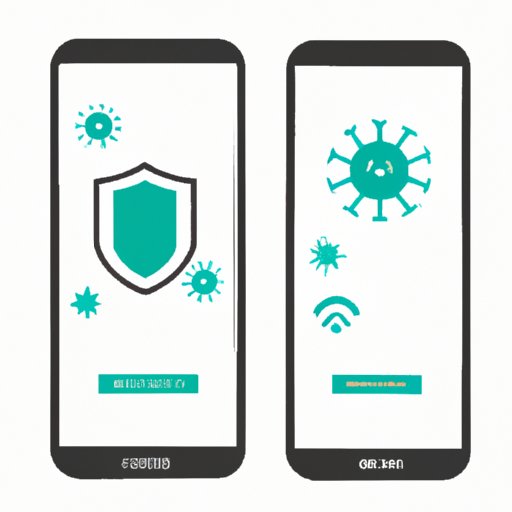Introduction
A virus is a type of malicious software designed to cause damage to your computer or mobile device. It can spread quickly through downloads, emails, and even text messages, and can be difficult to remove once it has infected your device. If you think your phone may have a virus, it’s important to take action immediately to prevent further damage.
In this article, we’ll explore the signs of a virus on your phone, what to do if you suspect your phone is infected, and how to protect your device from viruses in the future.

How to Identify if Your Phone Has a Virus
The first step in dealing with a potential virus on your phone is to identify the signs that your device may be infected. Here are some common symptoms that could indicate a virus:
Unusual behavior
If your phone is acting strangely, this could be a sign that something is wrong. This could include anything from random reboots to apps crashing unexpectedly. If your phone starts behaving differently than it usually does, it could be an indication of a virus.
Unfamiliar apps
If you notice any unfamiliar apps on your phone, this could be an indication of a virus. A virus may install malicious apps without your knowledge or permission, so if you see any apps you don’t recognize, you should investigate further.
Pop-up ads
If you start to see pop-up ads on your phone, this could be a sign of a virus. Malware often displays annoying and intrusive ads that can be difficult to get rid of. If you’re seeing pop-ups, it’s a good idea to run a scan with an antivirus app.

Common Signs of a Virus on Your Phone
Once you’ve identified the signs of a potential virus on your phone, there are some common symptoms to look out for. These can help you determine if your phone is indeed infected:
Slowed performance
If your phone is running slower than usual, this could be a sign that you have a virus. Viruses can take up valuable system resources, causing your phone to become sluggish and unresponsive.
Battery draining quickly
Viruses can also cause your battery to drain more quickly than normal. If your battery seems to be draining faster than usual, this could be an indication of a virus.
Unauthorized charges
If you start to see unauthorized charges on your phone bill, this could mean that your device is infected with malware. Malware can access your personal information, including credit card numbers, and use it to make purchases without your knowledge or consent.
What to Do if You Suspect Your Phone Has a Virus
If you think your phone may be infected, there are a few steps you can take to deal with the virus:
Back up your data
Before taking any further action, it’s important to back up your data. This will ensure that all of your important files and information are safe, even if your phone needs to be reset.
Run a scan with an antivirus app
Once you’ve backed up your data, you should run a scan with an antivirus app. This will help to identify any viruses or other malicious software on your phone.
Reset your phone
If the scan identifies any viruses, you should reset your phone to its factory settings. This will remove any viruses or other malicious software, but it will also delete all of your data, so make sure you’ve backed up your files first.

How to Protect Your Phone from Viruses
Once you’ve removed any viruses from your phone, you should take steps to protect your device from future infections. Here are some tips for keeping your phone secure against viruses:
Keep your software and apps up to date
It’s important to keep your phone’s operating system and apps up to date. Software updates often contain patches for security vulnerabilities, which can help to protect your device from viruses.
Don’t click on suspicious links
Be wary of clicking on any suspicious links, particularly in emails or text messages. These links may contain malicious software that can infect your phone.
Be careful when downloading apps
You should also be careful when downloading apps. Stick to reputable app stores, and read reviews before installing any new apps on your phone.
Tips for Keeping Your Phone Secure Against Viruses
Finally, here are a few tips for keeping your phone secure against viruses:
Use a secure password
Using a strong and secure password for your phone can help to protect it from viruses and other malicious software. Make sure your password is at least 8 characters long and contains a mix of upper and lowercase letters, numbers, and symbols.
Install a mobile security app
Installing a mobile security app can help to protect your device from viruses and other threats. Look for an app that offers real-time scanning and automatic updates.
Regularly back up your data
Finally, it’s important to regularly back up your data. This will ensure that all of your important files and information are safe, even if your phone is infected with a virus.
Conclusion
Viruses can cause serious damage to your phone, so it’s important to take action if you suspect your device is infected. By identifying the signs of a virus, running a scan with an antivirus app, and resetting your phone, you can remove any viruses and protect your device from future infections. Finally, remember to keep your software and apps up to date, use a secure password, install a mobile security app, and regularly back up your data.
Taking these steps can help to keep your phone secure against viruses and other malicious software. So if you think your phone may have a virus, take action today to protect your device.


